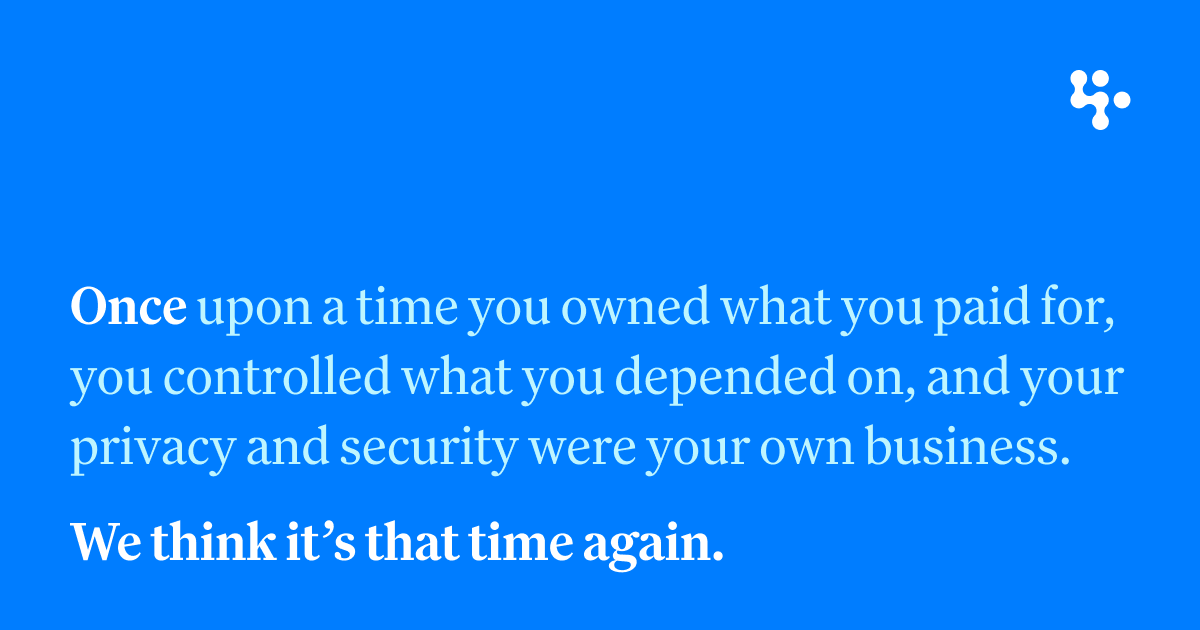“Monday”.length is working JavaScript and does equal 6. No print command afaik though.
FlumPHP
- 3 Posts
- 21 Comments

 5·9 months ago
5·9 months ago100%
I program – yet I’ve been asked to fix a camera and Apple Maps.

 18·9 months ago
18·9 months agoThey mean jank:
jan·ky adjective, informal adjective: jank
of extremely poor or unreliable quality. "the software is pretty janky"

 36·9 months ago
36·9 months agoThe things that make me a good programmer:
- I read error messages
- I put those errors in Google
- I read the results that come up
Even among my peers, that gives me a leg up apparently.
The go community is strongly opinionated in unique ways. For example, using libraries is generally frowned upon. You either use something included in the language itself (standard library) or copy/paste the code you wrote in another project. There’s also advocacy for shorter variable names which generally seems counter to the normal “write descriptive variable name” mantra.
All in all, I hope the ideas / opinions came from a good place and then some people took them as black & white rules. But they also come off as one or two people’s pet peeves who got to build a language around them.
I’m going to have to print out the Go version for all future “it’s idiomatic” and “but the community!” debates at work

 103·11 months ago
103·11 months agoJust add them. You’re a developer and automated testing is one of our tools. A woodworker wouldn’t ask permission to sand.

 1·1 year ago
1·1 year agoSending passwords via email Will compromise any passwords sent via email.
100%. But that is a different problem and a different attack vector than storing passwords in plain text for authentication. When reporting security issues, it’s important to be precise.

 162·1 year ago
162·1 year agoI too want my query results in an object, but thankfully libraries like sqlx for golang can do this without the extra overhead of an ORM. You give them a select query and they spit out hydrated objects.
As far as multiple DBs go, you can accomplish the same thing as long as you write ANSI standard SQL queries.
I’ve used ORMs heavily in the past and might still for a quick project or for the “command” side of a CQRS app. But I’ve seen too much bad performance once people move away from CRUD operations to reports via an ORM.

 5·1 year ago
5·1 year agoRight. Even pay-once software can have a phone home component that disables it if the creator deems it. So really we’re talking about old versions of software that just used offline license keys which were easily cracked.
I honestly really like the Jetbrains model where they offer a subscription for continual updates but you also get a fallback version you can use forever if you decide to stop paying. It acknowledges that you aren’t costing them money if you aren’t getting the new updates.

 1·1 year ago
1·1 year agoInteresting. I’ll have to find some docs and share it with my co-workers because they definitely don’t use build-in refactoring. Thanks!

 51·1 year ago
51·1 year agoJetbrains IDEs do a lot of indexing and caching so that operations that normally take a bit are faster. Full text search, find usages, identifying interface usage in duck types, etc.
But the killer feature for me is the refactoring tools. Changing a function signature, extracting an interface, moving code to new files or packages, etc. I pair with folks who use VS Code and its a bit tedious watching them use find and replace for renaming things.
I’ve never been able to benefit from an IDE in a way that make up for how much slower and more bloated they are.
That does sound legit if you have resource limitations. Thankfully I’ve always worked for corporations that hand out MacBook Pros like candy. Normal day for me is having two Jetbrains IDEs open with Chrome, Slack, Zoom, and a dozen containers. Still runs smooth.

 21·1 year ago
21·1 year agoI’m not convinced that “strong pairing” is the best way to pair but even people who rail against agile ideology tell you that you’re pairing wrong if you don’t follow it precisely.

 8·1 year ago
8·1 year agoCode review is overrated and often poorly executed, most things should be checked automatically (review should still be done though)
I think part of this is caused by the fact that a lot of people are bad at code reviews so they focus on things that a linter could have told you. Being able to read code isn’t necessarily the same skill as being able to write it – as evidenced by the knee jerk reaction to throw out any coffee we didn’t write ourselves.
I still create code reviews when I’m working on a project alone because it gives me a different perspective on the changes I’ve made.

 8·1 year ago
8·1 year agoToday I removed code from a codebase that was added in 2021 and never ever used. Sadly, some people are as content to litter in their repo as they are in the woods.

 6·1 year ago
6·1 year agoPlease don’t say the new language you’re being asked to learn is “unintuitive”. That’s just a rude word for “not yet familiar to me”.
Yeah. I’ve written in six or so different languages and am using Go now for the first time. Even then, I’m trying to be optimistic and acknowledge things are just different or annoying for me. It doesn’t mean anything is wrong with the language.

 3·1 year ago
3·1 year agoNot arguing either side, but I’d love to hear your reasoning.

 5·1 year ago
5·1 year agoYeah, I’d say your road to C# should pretty much be syntax then. Check out a course on exercism and read a bit about common idioms in C#.

 4·1 year ago
4·1 year agoWhat language are you familiar with? Switching between the C-style OOP languages is honestly pretty straightforward.





The library hadn’t had any updates in 2 years before this. Clearly it wasn’t maintained. If you’re a user and bothered by this super edge case “vulnerability”, fork it and take on the responsibility yourself.